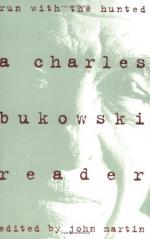|
This section contains 667 words (approx. 3 pages at 300 words per page) |

|
SOURCE: “A Bit on the Wild Side,” in Times Literary Supplement, May 4, 1984, p. 486.
In the following negative assessment of Hot Water Music, Montrose contends that the “misfires occur far too often even by his erratic standards, the compensations too rarely and too meagrely.”
Although not an exclusively autobiographical writer, the prolific Charles Bukowski has always drawn heavily on personal experience for his poems, stories, and novels; certainly, the presence of Bukowski himself, usually in the transparent disguise of “Henry Chinaski”, has normally been a feature of his better work. Fortunately, an eventfully misspent adulthood supplied a fund of experience rich in potential. Bukowski's uses of it were, admittedly, wildly uneven in quality, but, at his best, notably in various early stories, he reproduced the squalor and violence of low-life L.A. with the dirtiest of dirty realism. In 1970, aged fifty and with an emerging reputation, Bukowski became a...
|
This section contains 667 words (approx. 3 pages at 300 words per page) |

|


